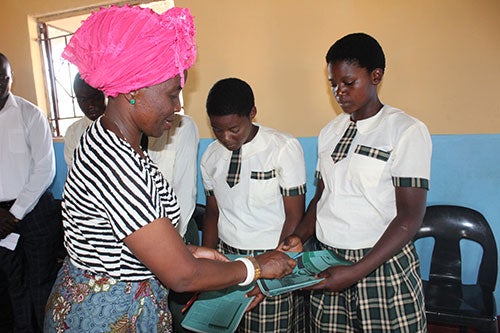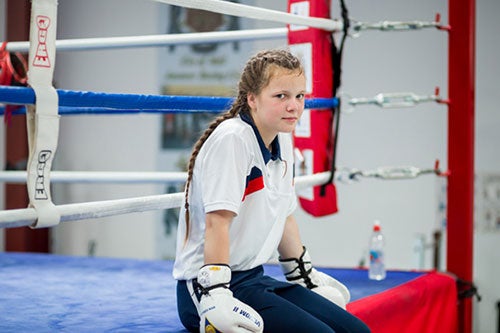News
If you want to change the world, start at home: New tool offers roadmap for changing social norms
- 20 July 2020
News
UNITED NATIONS, New York/KATETE, Zambia/OUAGADOUGOU, Burkina Faso – “As a female traditional leader, my aim is to be a role model within my chiefdom. I want to ensure that we collectively challenge social and traditional norms and practices that negatively affect our women and girls,” said Kawaza, chieftainess of the Chewa people.
Chieftainess Kawaza leads more than 650 villages with some 100,000 people, one of the largest chiefdoms in Zambia’s Eastern Province.
She is one of many traditional and community leaders throughout Eastern Province who are challenging harmful social norms – including child marriage, risky initiation, and impunity for perpetrators of sexual abuse.
“Many girls are forced to drop out of school in order to undergo initiation rites,” the chieftainess noted. These rites often include inaccurate information about sexual and reproductive health. In some cases, young people are encouraged to “practice” sexual activity, which can lead to sexually transmitted infections, including HIV, as well as unintended pregnancy.

“[I] instructed the traditional counsellors who conduct the initiation rites to revise the curriculum to focus only on progressive topics and cultural practices that promote respect for human rights," Chieftainess Kawaza said. “I have also issued a directive for all traditional ceremonies to take place only during school holidays.”
She has seen a transformation in perceptions around these practices. But this approach is not limited to Zambia. Similar efforts are helping to change beliefs and practices all around the world, a new publication shows.
How Changing Social Norms is Crucial in Achieving Gender Equality demonstrates how this approach has successfully helped to end harmful norms in different regions of the world. It also highlights common steps that can be applied to changing all kinds of discriminatory norms to achieve gender equality.
The key, experts say, is empowering community members to deliberate about how their practices do or do not uphold their own deeply held values. This process leads to change.
This approach can arise organically, as the world saw with the #MeToo movement, where women’s voices and experiences were elevated by members of the media, sparking calls for an end to sexual harassment.
But these steps – the identification of a harmful norm, advocacy by prominent individuals, the exchange of experiences and perspectives within the community, and finally calls for change – can also be applied deliberately, the new publication notes.
The approach has successfully driven collective action around the world, reaching millions.
“One of the successful interventions has been the public declarations of the abandonment of female genital mutilation,” said Lacina Zerbo, who works for UNFPA in Burkina Faso. “More than 4 million people have publicly abandoned FGM."
Similar efforts to end FGM have reached more than 34 million people around in 16 countries supported by the UNFPA-UNICEF Joint Programme on FGM. The efforts have also led to a raft of new laws and policies.
The process, Mr. Zerbo said, depends on “creating trust between community members and influencers or decision-makers.”
“Influencers are key to transforming norms,” said Nafissatou Diop, UNFPA’s chief of gender and human rights, who spearheaded the new publication. “They can be traditional leaders in some contexts. In other contexts, it’s religious leaders. In other countries, it’s political leaders or elders.”

Next, community members should be encouraged to listen to new ideas and reflect on their values. “The second element is discussion, value deliberation and education. It can take place in girls’ schools, among parents groups, through television and radio, or in open spaces,” Ms. Diop said. “Diverse forces and ideas and positions need to be confronted and need to come together in that discussion.”
In the United Kingdom, a similar approach is helping to address menstruation stigma. “In the UK, a culture of shame is having a significant impact on the lives of many girls and young people who menstruate,” said Bekky Ashmore of Plan International UK. “Period stigma, combined with the high cost of period products and a lack of education, make up a ‘toxic trio’ of period poverty.” Plan is working with youth and grassroots advocates at all levels to help change these norms.
The abandonment of harmful social norms is a normal part of progress. Communities have gradually and collectively abandoned discriminatory social norms “from foot binding to different types of gender violence” over the last few centuries, says Ms. Diop.
But recent social change has been accelerated by the exchange of ideas, perspectives and beliefs over digital platforms and social media. New ideas are never more than a click away.
This has helped to amplify marginalized voices around the world. Advocates and community groups can help steer these conversations towards productive changes that affirm human rights.
“The virtual world is where conversations are happening. With social media, people are able to galvanize and activate change in any part of the world, especially among those battling discriminatory norms,” said Ms. Diop, emphasizing the importance of empowering marginalized groups raise their voices. “Social media has given communities, and youth, in particular, the power of unity to drive collective change. And this is what we need: Collective behaviour to make changes that make the world a more equal place.”